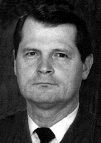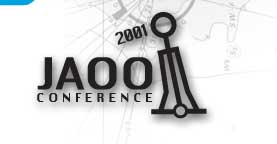|
|
 |
<bigwig> service: jaoo
KEYNOTE
Science After the Information Age: The Biointelligence Age
Abstract
There is the perception that we are at the height of the Information Age revolution and
that it is growing exponentially and will continue to do so. The Information Age is NOT
the Future, the Information Age is the present. There is something else in the future.
The Information Age is already a century old (telegraphy, telephony, radio transmission all
began at the end of the 19th century). Actually the spreading of the Internet defines the
culmination, and hence waning, of the Information Age. The biotechnology revolution is
over 40-50 years old, and is still promising results in genetic engineering, drug delivery
and decoding the secret script of life. A new era has been brewing, and for lack of
another name, a placeholder of the Biointelligence Age has been given. This is the
combination of the biologic, physical and information worlds - into single entities. One of the
earliest and simplest device is the implanted programmable cardiac pacemaker, mimicking the
biologic performance of a living pacemaker. Emerging technologies and fields in bio-sensors and
bio-materials (bio+physical), biocomputation and bio-informatics (bio+information) and
MEMS microsensors and distributed networking (physical + information) have redefined the
direction of the future. Combining all three areas results in systems and devices which are tiny,
adaptable, embedded and intelligent. These micro-systems will become ubiquitous, embedded in
everything (from food, to appliances to our body) and communicate through massively distributed
networks. They will be programmable, flexible and transparent to daily living. The result will be to
change our world from dumb and unconnected to "smart" and networked. The implication for
science is that our appliances, homes, food and the daily conduct of living is about to u
ndergo yet another momentous change.
A number of the new technologies that are emerging will be a bellwether for things to come
- things like smart materials (the smart tee-shirt), bio-mimetics (self assembling and
self adjusting machines), tissue engineering (growing programmed stem cells on bioresorbable
matrices for artificial organs) and smart, self-repairing information networks to
guarantee high quality of service. As the technologies evolve further, totally independent
microsystems (eg implantable diabetes system with a stem cell programmed as a glucose sensor,
microprocess or to determine amount of drug delivery, and microfluidic systems to release proper
amount of insulin - all embedded and autonomous) will take on aspects of non-cognitive
artificial life - the systems will seem to have a life of their own. A system such as
the diabetes system can help resolve some of our most difficult medical problems,
such as realtime management of diabetes, and even more important - compliance.
Within the home, the appliances will be embedded with micro sensors or be constructed
of smart material and networked together. They may become self cleaning, and will be
multifunctional. The home will be integrated with information science tools and be
networked to the outside world, however this networking will be enabled by knowledge
agents which will anticipate the needs of the person or be capable of finding precisely
the piece of information needed. The advances in medicine such as robotics, genetic
manipulation and tissue engineering will provide new therapeutic modalities, such as
implantation of genetically engineered cells to replace damaged or resected organs,
and new methods to slow the aging process while maintaining excellent health.
Even as the struggle continues to understand the vortex of change around us,
there are words of caution. Ray Kurzweiler, in his Age of Spiritual Machines, and
Eric Drexler, in his Engines of Creation, caution about the ability to control the
new technologies which are unleashed. Bill Joy has raised the specter of a future
where our creations, nanotechnology, intelligent robots and genetically designed
foods or organisms, will take on a life of their own as described in "Why the Future
Doesn't Need Us". Concerned scientists are beginning to seriously deliberate these
questions, wondering if the new directions of research are a Faustian bargain.
While it is extrapolated from current growth of computer science that by 2030 to 2040
AD computers will have the same computational power of a human brain, will such systems be
intelligent, have emotions or even be controllable by humans? Unlike any time in history,
scientists are proactively considering the long-term social consequences for mankind of
their scientific inquiry. The success of cloning in animals has forced the world to
address its implications for humans and put in place regulatory barriers; will such
regulation be necessary for the technologies of the BioIntelligence Age?
In a world enamored by technology and exhilarated by the accelerated rate of
change,
how can we proceed prudently without slowing the rate of progress? Many of our national
agencies already have exploratory programs in many of these interdisciplinary areas.
The Defense Advanced Research Projects Agency (DARPA) has initiated its BioInterfaces
program, National Aeronautics and Space Administration (NASA) has begun programs in
Astrobiology and Bioastronautics, the National Cancer Institute (NCI) of the National
Institutes of Health (NIH) has the Unconventional Innovations Program, and the National
Science Foundation (NSF) is proceeding with the Nanotechnology initiative. It is
therefore
contingent upon the scientific community to squarely face these issues and participate in
their evaluation and, if necessary, their regulation before external forces take the
decisions out of the hands of scientists. Technology has provided an opportunity for a
future that is bright, but we must walk into the BioIntelligence Age with our eyes wide open.
|
|

|
Presentations:
Science After the Information Age: The Biointelligence Age (Keynotes, Managing Software Projects)
Richard Satava, Yale University
Monday [17:00 - 18:00]
Conference Hall
Next speaker

|




